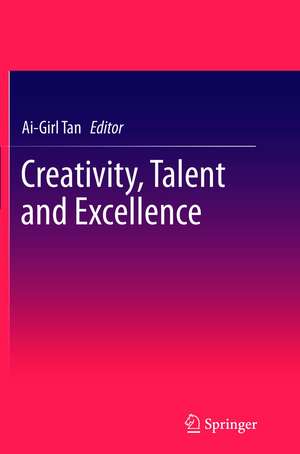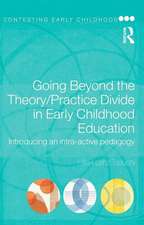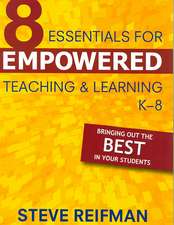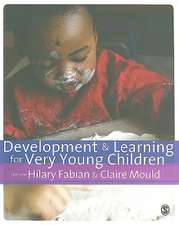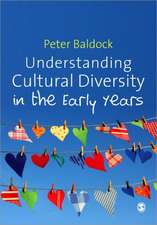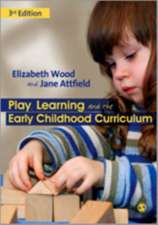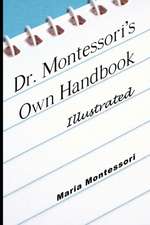Creativity, Talent and Excellence
Editat de Ai-Girl Tanen Limba Engleză Paperback – 29 ian 2015
The contributing authors recognize that exploring the nature of creativity necessitates a new paradigm in research and praxis in which integration, collaboration, and the synthesis of knowledge and expertise are key factors. Their chapters detail the results of studies relating to to creativity, talent, school excellence, team and goal setting, innovation and organizational excellence, resilience, self-regulation, and personal epistemology. Clearly defined sections take on discrete aspects of the topic that include a vital assessment of the challenges that lie ahead in fostering the creativity, talent and excellence of the young and in doing so, allowing them to play a positive and innovative role in a variety of social contexts.
| Toate formatele și edițiile | Preț | Express |
|---|---|---|
| Paperback (1) | 563.40 lei 38-44 zile | |
| Springer Nature Singapore – 29 ian 2015 | 563.40 lei 38-44 zile | |
| Hardback (1) | 650.04 lei 6-8 săpt. | |
| Springer Nature Singapore – 8 dec 2012 | 650.04 lei 6-8 săpt. |
Preț: 563.40 lei
Preț vechi: 704.25 lei
-20% Nou
Puncte Express: 845
Preț estimativ în valută:
107.80€ • 112.86$ • 89.20£
107.80€ • 112.86$ • 89.20£
Carte tipărită la comandă
Livrare economică 01-07 aprilie
Preluare comenzi: 021 569.72.76
Specificații
ISBN-13: 9789814560931
ISBN-10: 9814560936
Pagini: 328
Ilustrații: XLVIII, 280 p.
Dimensiuni: 155 x 235 x 17 mm
Greutate: 0.46 kg
Ediția:2013
Editura: Springer Nature Singapore
Colecția Springer
Locul publicării:Singapore, Singapore
ISBN-10: 9814560936
Pagini: 328
Ilustrații: XLVIII, 280 p.
Dimensiuni: 155 x 235 x 17 mm
Greutate: 0.46 kg
Ediția:2013
Editura: Springer Nature Singapore
Colecția Springer
Locul publicării:Singapore, Singapore
Public țintă
ResearchCuprins
Foreword by Beth Hennessey.- Foreword by Jiannong Shi.- Introduction: Reflections on Creativity, Talent, and Excellence Ai-Girl Tan.- Part I: Conceptions of Creativity and Cultivating Creativity.- Chapter 1 Learning as a Creative Process by Heidrun Stoeger.- Chapter 2 Soaring up the Tower of Creativity by Albert Ziegler and Wilma Vialle.- Chapter 3 The Three Main Creative Operations: Widening, Connecting, Reversing by Alessandro Antonietti and Barbara Colombo.- Chapter 4 Psychology of Cultivating Creativity in Teaching and Learning by Ai-Girl Tan.- Chapter 5: Creativity and Problem-based Learning: A Neglected Relation by Heinz Neber and Birgit J. Neuhaus.- Part II: Studies on Creativity and Cultivating Creativity.- Chapter 6 The What and the How of Creativity: An Exploratory Study by Paola Pizzingrilli and Stefania Molteni.- Chapter 7 Creativity and Early Talent Development in the Arts in Young and Schoolchildren by Anna N.N. Hui, Mavis W.J. He, and Elaine S.C. Liu-Au.- Chapter 8 Self-Regulated Learning and Creativity as Related to Age and Gender in the Transition from Elementary to Junior High School by Mayumi Oie, Yasuhiko Fujie, Yu Okugawa, Shinichiro Kakihana, Shoko Itaka, and Hisashi Uebuchi.- Chapter 9 Creativity Self-efficacy and its Correlates by Ai-Girl Tan, Tianchang Li, and Heinz Neber.- Chapter 10 Personal Epistemology and Its Relationship with Creativity by Ji Zhou, Jiliang Shen, and Detlef Urhahne.- Part III Conceptions and Studies on Creativity and Excellence in Organization.- Chapter 11 Entrepreneurs’ Creativity and Innovation: A Key to Performance by Dominika Dej, Meir Shemla, and Jürgen Wegge.- Chapter 12 Creating an Innovative Team: The Promise of Team Diversity by Meir Shemla, Dominika Dej, and Jürgen Wegge.- Chapter 13 When Group Goal Setting Fails: The Impact of Task Difficulty and Supervisor Fairness by Jürgen Wegge andS. Alexander Haslem.- Part IV: Studies on Educational Excellence.- Chapter 14 The Hector-Seminar: A New Enrichment Program for MINT/STEM-talents by Kurt A. Heller.- Chapter 15 Joint Function of Perceived Classroom Goal Orientations and Personal Achievement Goals on Student School Excellence by Yanhua Zhao and Rudolf Tippelt.- Chapter 16 Effects of Video Source Presentation and Cue Retrieval on Analogical Problem Solving by Mong Song Goh, Ai-Girl Tan, and William Choy.- Part V Challenges Ahead.- Chapter 17 Perspectives on Gifted Education in the Third Millennium by Kurt A. Heller.- Chapter 18 Transitional Gaps and Resilience in Japan by Makio Taira.- Epilogue: Toward Integrative Understanding of Creativity, Talent, and Excellence by Ai-Girl Tan
Recenzii
'The evolution of research on the interface between creativity and culture now continues with the 2012 publication of Creativity, Talent and Excellence. As evidenced by the chapters in the present volume, whether their focus is on the classroom or the workplace, scholars from around the globe are showing an exciting and newfound commitment to the construction of models that best capture the development and cultivation of creativity in their own nations.'
– Professor Beth Hennessey, Weselley College, USA
'We would like to express gratitude to the editor and authors of this volume who give us an opportunity to think around some essential issues of creativity. Other readers may have same experiences like us from different points of view.'
– Professor (emeritus) Akio Kikuchi, Tokyo Institute of Technology, Tokyo, Japan.
– Professor Beth Hennessey, Weselley College, USA
'We would like to express gratitude to the editor and authors of this volume who give us an opportunity to think around some essential issues of creativity. Other readers may have same experiences like us from different points of view.'
– Professor (emeritus) Akio Kikuchi, Tokyo Institute of Technology, Tokyo, Japan.
Notă biografică
Tan, Ai-Girl has been a faculty of the Nanyang Technological University Singapore from 1995. She was a graduate scholar of Tokyo Institute of Technology, Japan (Iwatani Foundation) and Ludwig-Maximilians-University of Munich, Germany (German Academic Exchange Service, DAAD). In 2008, she was invited to assume a visiting professor position at the Department of Psychology, LMU sponsored by DAAD. In 2011, she spent one semester as a visiting professor at the Department of Asian Studies, Kansai Gaidai University, Osaka, Japan. Between 2006 to present, she delivered invited lectures and keynote addresses on creativity and talent at universities in Asia (China, Hong Kong, Japan, Korea, Malaysia, and Taiwan) and in Europe (Germany and Italy). She is a life member of the Educational Research Association (Singapore) and Autistic Association (Singapore), a full member of the Japan Creativity Society, American Educational Research Association, Association of Psychological Science, and an advisory panel of the Talent Development and Excellence, a journal of the International Research Association of the Talent Development and Excellence. She organized two creativity conferences in collaboration with a professor at LMU (September, 2008, sponsored by DAAD; June 2010, sponsored by University Funds), and chaired numerous international symposiums on creativity. Her research areas include creativity, multicultural education, well-being, excellence and talent. She has coached more than 30 Master and Ph.D. theses.
Textul de pe ultima copertă
It is broadly accepted that the dynamism of humanity’s responses to our evolving scientific, social and environmental needs depends on our creativity, and this volume reflects the multiplicity of perspectives in the theory and practice of creativity. It examines the central issues that animate the themes of creativity, talent development and excellence in schools and in the workplace, as well as analysing their related socio-cultural activities and processes. Forged in the workshops of a number of conferences and symposia, this collection represents in itself a creative partnership between European and Asian academics. Thus it includes contributions from various cultural and organizational settings, as well as chapters that enhance our conceptual models of creativity in both learning and teaching.
The contributing authors recognize that exploring the nature of creativity necessitates a new paradigm in research and praxis in which integration, collaboration, and the synthesis of knowledge and expertise are key factors. Their chapters detail the results of studies relating to to creativity, talent, school excellence, team and goal setting, innovation and organizational excellence, resilience, self-regulation, and personal epistemology. Clearly defined sections take on discrete aspects of the topic that include a vital assessment of the challenges that lie ahead in fostering the creativity, talent and excellence of the young and in doing so, allowing them to play a positive and innovative role in a variety of social contexts.
The contributing authors recognize that exploring the nature of creativity necessitates a new paradigm in research and praxis in which integration, collaboration, and the synthesis of knowledge and expertise are key factors. Their chapters detail the results of studies relating to to creativity, talent, school excellence, team and goal setting, innovation and organizational excellence, resilience, self-regulation, and personal epistemology. Clearly defined sections take on discrete aspects of the topic that include a vital assessment of the challenges that lie ahead in fostering the creativity, talent and excellence of the young and in doing so, allowing them to play a positive and innovative role in a variety of social contexts.
Caracteristici
Presents fresh conceptual paradigms in our analysis of creativity, talent and excellence Provides a forum for innovative cross-fertilization between mainstream psychology and these three key topics Enhances current practice regarding creativity and excellence through comparative analysis of Asian and European approaches
